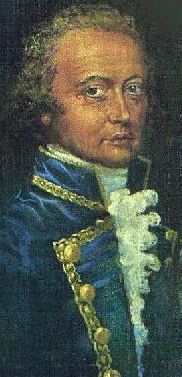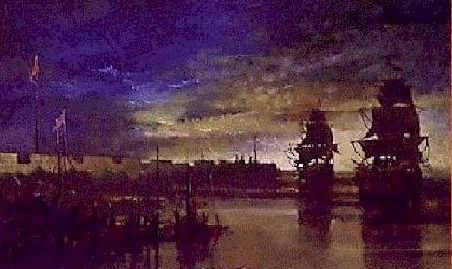|

THE POLITICAL AND
ECONOMIC CONSIDERATIONS
Admiral
Lord Howe sighed and glowered at his still un-cooperative parrot recently
returned still untrained by Mr Pitt. A smirk distorted the line of the
Admiral's mouth as he closed his eyes and ruefully shook his head. Finally
he turned to back to Aaron Graham and slapped the desk. "Your tribunal
is arranged and time is short, have you informed Banks?"
"Yes", replied
the judge advocate.
"So what did you
think of Sir Joseph Banks?"
"Banks is
a hypocrite", relied Grahanm. "He may well be a patron of the
natural sciences and supporter of reform, but in reality he is increasing
his own wealth by the practical exploitation of the very objects of his
studies." Howe seemed content for once to let Graham explain and stretched
back in his chair where he began using his letter opener to clean under
his mails.
"Do you want my understanding the circumstances
surrounding Bounty's voyage?" enquired the younger man.
"Go ahead," Howe's
eyes narrowed shrewdly as his quick glance swept over his employee.
 |
Graham launched into his explanation. "Campbell
and Banks together own plantations and run a Mercantile house in Jamaica.
The businesses trade in slaves, sugar, rum and molasses as well as other
goods to West Africa. They buy and sell, import and export, and thereby
control both the means and the methods. Campbell is the high profile business
man whereas Banks plays a more secretive role. I believe the commercial
expression is sleeping partner. I cannot readily establish how and
when they came together but their interests are both mutual and profitable.
Their mercantile company owns and leases ships that sail the usual West
African, Jamaican and Liverpool triangle."
Even though Howe was cleaning
his nails with his letter opener he listened intently.
Graham continued talking as
he paced over and gazed out the window.... |
(Illustration – Captain William Bligh at 33yrs)
"Some
time ago Banks realised that by feeding the Jamaican slaves breadfruit
instead of the costly imported grain he could substantially reduce the
cost of production of sugar, molasses and rum. He had witnessed the breadfruit's
popularity in Tahiti and thought its introduction to Jamaica would be
enormously profitable, a cheap and reliable food source for over half a
million slaves. If successful it could cripple the foreign competition
and make the fortunes for himself, Campbell and the other English planters.
The French, Spanish and Dutch interests in the Indies would be unable to
compete and be at a great disadvantage.
Howe interrupted without
looking up. "So they saw the opportunity to have the Admiralty finance
the venture – better than using their own resources I suppose."
"Yes, the cover of
an expeditionary voyage it was perfect. for a voyage whose primary purpose
was to purchase and transport bread-fruit to Jamaica. Although called a
voyage of discovery, of scientific research, it was essentially a commercial
venture. Banks enlisted the support of the King to whom he recommended
Campbell's man Bligh. I have no doubt Bank's argued the national and patriotic
benefits of the project and how England could benefit at he expense of
the Europeans and Americans. A better grip on the European sugar market
would also financially hurt the Dutch, French and the Spanish and their
interests in the new world. Banks may have offered the King a financial
interest? With his son's gambling debts who knows?
Howe rubbed his chin thoughtfully
remembering the constant grumbling for more funds to support the royal
household. "Mmm, 'tis possible I suppose."
Graham continued dryly,
"as part of their plan Campbell and Banks in turn promised to supply
the Naval Board with rum at a reduced price if the mission succeeded."
Howe nodded, aware every
how London and Liverpool merchant sought entry to the rum market.
"But it was vitally
important the whole project be kept secret if they were to gain the advantage
over the foreign producers, or anyone else," added Graham.
"And presumably for
Campbell to disguise his interests and Banks to explain the scientific
usefulness of the venture. Very clever," Howe smiled.
"With the added advantage
the need for less slaves from West Africa. The King and Wilberforce and
his anti-slavers would welcome any hint the government was abandoning slavery."

(Illustration – Slavers returning to port in
the West Indies 1770)
Howe, like
Pitt, cared little for Wilberforce and had no strong feelings for or against
slavery. He waved the argument away and asked, "if it was to appear
purely as a voyage of discovery and exploration, scientific in nature,
then why all the preparations? Why the pots, watering systems and all the
rest?"
"Many people were
suspicious but no one had any idea of the real purpose apart from the random
selection of specimens. You may recall the delayed departure times? They
were mostly caused by certain merchants smelling a rat and trying to find
out the real reason for the voyage. From past experience they knew about
Bank's commercial successes and they thought once again he was up to something.
Some even attempted to put spies on board. The only ones who knew the real
purpose of the voyage were the Admiralty, Banks, Campbell and presumably
Bligh."
"Go on."
"Well Mr Pitt is
not a naval man—and certainly not practical in that sense—however his attitude
to money is as mean spirited and suspicious as your own." Graham could
not resist the backhanded compliment. "As a consequence, the meagre
budget allowed for the expedition denied Bligh the class of vessel and
the marines normally required for such a journey. The mission therefore
was flawed from the very start. After the mutiny nothing much changed except
that the real reason for the voyage could no longer be such a secret. When
Bligh returned home, after his mutiny, the interested parties all made
sure they concealed their participation and connection and everything.
A new attempt became urgent."
Howe said, "and because
of this new court martial even more secrecy?"
"Reputations are
now at stake. Bank's, Campbell's, Bligh's, and if the King is linked there
will be outrage."
Howe face froze in a grimace
and looked up sharply "Of course none of this can be used in Heywood's
application. Your orders are to make every effort to free Heywood without
involving the King, the Admiralty, or bring disgrace on the Navy."
Graham shrugged. "Mmm,
but you asked me about the voyage. The voyage concerned money, slaves,
rum, sugar and the chance of huge profits under a cloak of strategic nationalism.
I make no comment on my brief"
"So you believe Sir
Joseph Banks was the facilitator, the main instigator?" Howe tapped
his fingers.
"Yes, his loyalties
lie with his protege and fellow scientist Bligh and with his business partner
and Bligh's uncle-in-law Campbell. I will not even attempt to unravel Campbell's
other commercial interests but as you know he is involved in the tender
and management of the hulks and in convict transportation to mention but
two."
Howe's fingertips tapped
harder, "Again none of this can be disclosed."
|